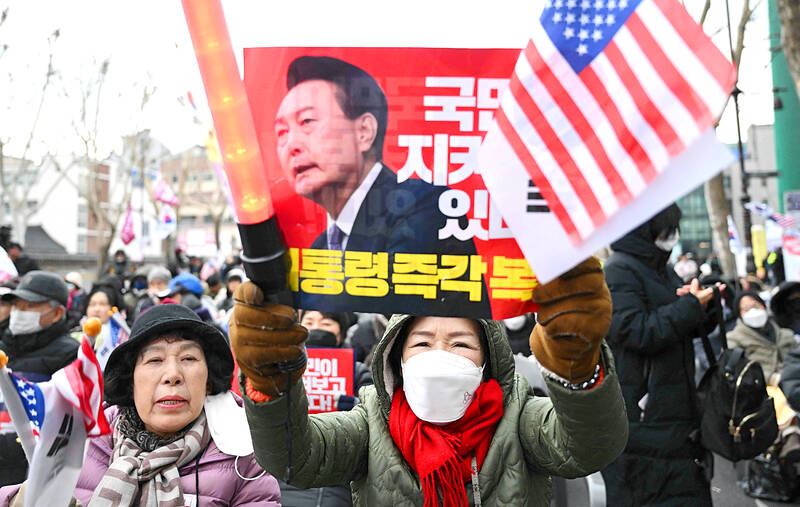Ousted South Korean President Yoon Suk-yeol yesterday was facing his final impeachment hearing before judges decide whether to formally remove him from office over his disastrous martial law declaration.
Yoon’s short-lived suspension of civilian rule plunged democratic South Korea into political turmoil, and he was removed from office by parliament in December last year.
After weeks of fraught impeachment hearings at the Constitutional Court in Seoul, yesterday’s proceedings began at 2pm, but Yoon was not present, a journalist in the courtroom said.

Photo: AFP
In opening remarks, Yoon’s defense team cited a US Supreme Court ruling last year, [US President] Donald Trump v the United States, arguing that the ousted president cannot be punished for “exercising his core constitutional powers.”
That ruling “should be considered in the context of impeachment proceedings,” Yoon’s lawyer Lee Dong-chan said.
In response, prosecutor Lee Gum-gyu spoke emotively about his son, an active duty soldier he said would have been forced to participate in Yoon’s martial law.
“As a citizen and a father, I feel a sense of rage and betrayal toward Yoon, who tried to turn my son into a martial law soldier,” he told the court.
Yesterday’s session was Yoon’s last before the eight judges go behind closed doors to decide his fate.
A number of lawmakers from his ruling People Power Party were in attendance.
Yoon was expected to deliver a closing argument in his defense, with representatives of parliament given time to present the case for his removal.
Outside the court, pro-Yoon protesters chanted “Drop the impeachment,” and some held signs denouncing the Chinese Communist Party and North Korea — which they have accused, without evidence, of interfering in South Korean elections to the benefit of the opposition.
Others held signs saying “Stop the Steal,” echoing Trump’s false claims of voter fraud when he lost the 2020 election to former US president Joe Biden.
A verdict is widely expected in the middle of next month.
Previously impeached South Korean presidents Park Geun-hye and Roh Moo-hyun had to wait 11 and 14 days respectively to learn about their fates.
If Yoon is removed from office, the nation must hold a fresh presidential election within 60 days.
The 64-year-old has also been behind bars since he was arrested last month on charges of insurrection, for which he could be sentenced to life in prison or even face the death penalty. His trial began last week.
Much of the impeachment trial has centered on whether Yoon violated the constitution by declaring martial law, which is reserved for national emergencies or times of war.
The opposition has accused the suspended president of taking the extraordinary measure without proper justification.
Yoon’s lawyer Kim Hong-il last week said that “the declaration of martial law was not intended to paralyze the state.”
Instead, he said, it was meant to “alert the public to the national crisis caused by the legislative dictatorship of the dominant opposition party.”
Yoon’s lawyers have also argued that his martial law declaration was necessary to investigate unsubstantiated allegations of electoral fraud in last year’s parliamentary poll.
A survey by polling company Realmeter released on Monday said that 52 percent of respondents support Yoon’s formal removal from office, but a Gallup poll, released last week, showed 60 percent in favor and 34 percent against his impeachment.

VAGUE: The criteria of the amnesty remain unclear, but it would cover political violence from 1999 to today, and those convicted of murder or drug trafficking would not qualify Venezuelan Acting President Delcy Rodriguez on Friday announced an amnesty bill that could lead to the release of hundreds of prisoners, including opposition leaders, journalists and human rights activists detained for political reasons. The measure had long been sought by the US-backed opposition. It is the latest concession Rodriguez has made since taking the reins of the country on Jan. 3 after the brazen seizure of then-Venezuelan president Nicolas Maduro. Rodriguez told a gathering of justices, magistrates, ministers, military brass and other government leaders that the ruling party-controlled Venezuelan National Assembly would take up the bill with urgency. Rodriguez also announced the shutdown

Civil society leaders and members of a left-wing coalition yesterday filed impeachment complaints against Philippine Vice President Sara Duterte, restarting a process sidelined by the Supreme Court last year. Both cases accuse Duterte of misusing public funds during her term as education secretary, while one revives allegations that she threatened to assassinate former ally Philippine President Ferdinand Marcos Jr. The filings come on the same day that a committee in the House of Representatives was to begin hearings into impeachment complaints against Marcos, accused of corruption tied to a spiraling scandal over bogus flood control projects. Under the constitution, an impeachment by the

Exiled Tibetans began a unique global election yesterday for a government representing a homeland many have never seen, as part of a democratic exercise voters say carries great weight. From red-robed Buddhist monks in the snowy Himalayas, to political exiles in megacities across South Asia, to refugees in Australia, Europe and North America, voting takes place in 27 countries — but not China. “Elections ... show that the struggle for Tibet’s freedom and independence continues from generation to generation,” said candidate Gyaltsen Chokye, 33, who is based in the Indian hill-town of Dharamsala, headquarters of the government-in-exile, the Central Tibetan Administration (CTA). It

China executed 11 people linked to Myanmar criminal gangs, including “key members” of telecom scam operations, state media reported yesterday, as Beijing toughens its response to the sprawling, transnational industry. Fraud compounds where scammers lure Internet users into fake romantic relationships and cryptocurrency investments have flourished across Southeast Asia, including in Myanmar. Initially largely targeting Chinese speakers, the criminal groups behind the compounds have expanded operations into multiple languages to steal from victims around the world. Those conducting the scams are sometimes willing con artists, and other times trafficked foreign nationals forced to work. In the past few years, Beijing has stepped up cooperation